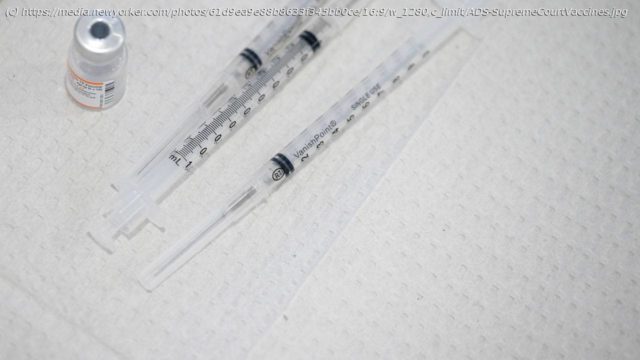The tenor of the conservative Justices’ questions suggested that the OSHA mandate, which would apply to about eighty million people, has little chance of going into effect in its present form.
“I’m not saying the vaccines are unsafe,” Justice Samuel Alito said, on Friday, during oral arguments at the Supreme Court in the case of National Federation of Independent Businesses v. the Occupational Safety and Health Administration, which involves OSHA ’s test-or-vaccine mandate for firms with a hundred or more employees, other than those who work at home or outdoors. He knew that the F.D.A. had approved the vaccines, he said. “I’m not contesting that in any way. I don’t want to be misunderstood. I’m sure I will be misunderstood.” Alito uttered those lines in a sour, singsong tone, as if he were speaking to a recalcitrant child and not, as he was, to Elizabeth Prelogar, the United States Solicitor General, who was defending OSHA in the case, which was brought by the N.F.I.B., an industry group, and twenty-seven states, all with Republican governors or attorneys general. What was hard to miss, if not to misunderstand, was Alito’s hostility to the mandate. The tenor of the questions asked by other Justices—notably Chief Justice John Roberts—similarly suggested that the mandate, which would apply to about eighty million people, has little chance of going into effect in its present form. The prospects look better for a second mandate, which applies only to workers in health-care facilities that receive Medicare and Medicaid funds, and would affect about ten million people. The oral arguments in that case, Biden v. Missouri, which combines cases initiated by the attorneys general of multiple states, immediately followed the first. But that outcome is hardly a sure thing, and that is remarkable on a couple of levels. First, while the supposed problem with the OSHA mandate is that it is federal overreach, the federal interest in the context of Medicare and Medicaid is fairly clear. As Justice Sonia Sotomayor put it, speaking from the government’s perspective, “If you want my money, your facility has to do this.” Justice Elena Kagan summed up the message to providers, in the context of controlling COVID -19, even more bluntly: “The one thing you can’t do is kill your patients.” Second, even though, like Alito, the lawyers challenging the mandates protested that they had nothing against COVID -19 vaccines, the thrust of their arguments was that getting vaccinated is a terrible imposition that reasonable people might be compelled to quit their jobs rather than endure. These are not fringe-group lawyers but the representatives of multiple states. Elizabeth Murrill, the Louisiana Solicitor General, described what was being asked of workers at Medicare and Medicaid providers as “an invasive, irrevocable, forced medical procedure” being imposed in an unprecedented “bureaucratic power move.” That is a lot to lay on a simple shot that protects against a disease that has taken more than eight hundred thousand American lives. Alito, after his self-pitying prelude, asked Prelogar to confirm that the vaccines have some risks, unlike, he said, “wearing a hard hat,” which has no “adverse health consequences.” When she noted that what risks there might be were smaller than those associated with COVID -19 “by an order of magnitude,” and that, in any event, the OSHA mandate offers a testing-and-masking alternative, Alito hardly seemed to listen—not even when Kagan jumped in to help Prelogar by noting that “regulators think of risk/risk trade-offs constantly.” When Prelogar mentioned unvaccinated workers who might be older or have comorbidities, Alito interrupted to say, “All of whom have balanced the risk differently, maybe very foolishly, but they want to balance the risks presented to their health in a different way. And OSHA says, no, you can’t do that.” “Well, one small factual correction, if I could, and then a broader legal point,” Prelogar replied. “I think it’s wrong to say that everyone who’s unvaccinated is just assuming the risk. Some people can’t get vaccinations for medical reasons. Some people have deeply held religious beliefs and are entitled to religious exemptions”—circumstances for which the mandate offers accommodations. “And OSHA is entitled to try to protect those unvaccinated workers, no matter the reason they’re unvaccinated.” That line was the broader legal point, and got at why the going has been so tough for a fairly simple, sensible set of mandates: vaccine skepticism has been joined not only with COVID -19 denialism and Trumpism but with regulatory skepticism, and indeed with hostility to the idea that the federal government has any place regulating businesses at all. OSHA has, in fact, required vaccines in certain settings in the past; people working in facilities that handle blood and blood products are supposed to be vaccinated against hepatitis B.






